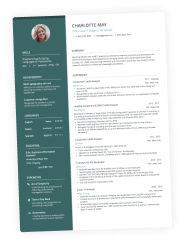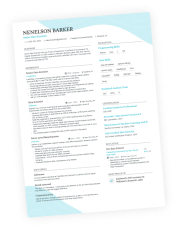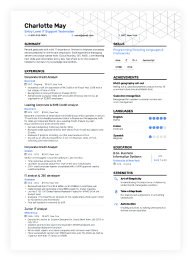We bet that you've at least once heard the quote that says leaders "are not born, but made".
Leadership is most certainly a path you've taken, even if you don't realise it.
What better space to describe this journey you've been on than your CV?
Leadership skills are important, especially if you're applying for a mid- to a senior executive role.
It's true that, in the end, effective leadership raises the overall output of the organisation.
If your actions inspire others to dream more, learn more, do more and become more, you are a leader.
There are plenty of companies out there - take for example Amazon and Netflix - who care about your leadership potential, even if you’re applying for a more junior role.
So, how do you go about describing such an intangible concept - that is leadership - within your CV?
Within this Enhancv guide, we'll answer:
- What are leadership skills?
- Why leadership is one of the most in-demand soft skills for your CV?
- How to use your various skills and achievements to support your leadership narrative across your CV?
- Three key CV sections you don't want to miss out on to define your leadership approach: tips and examples;
- Additional ways to best describe on your CV how you're able to lead others.
What are leadership skills?
At the heart of every organisation, you’ll find a person that:
- inspires others to believe in the set vision to achieve success;
- predicts the storms and leads others through them with a clear plan;
- influences and organises people around a common goal.
That's precisely what leadership skills help you achieve. They are valued by employers and easily transferrable from role to role and one industry to another.

PRO TIP
What is more, leadership is a soft or interpersonal communication skill that is a bit more complex to quantify on your CV.
That is why you need to define your leadership style via your and your team’s outputs and achievements.
Now that we have a basic definition of leadership, it's important to note that there are many approaches to it, seeing the ever-changing nature of organisations.
To get more into the details, leadership skills can also be defined by your ability to:
- communicate organisational goals;
- gravitate towards your own and your team’s strengths;
- direct, supervise, and effectively guide;
- take risks, while remaining positive and driven;
- see advantage in every opportunity that comes your way;
- use talent optimally to achieve an objective in unison.
Leadership helps you empower others to believe in themselves and become the best they can be. What is more, this skill set builds upon your self-confidence, helping you attain more through a team-driven mindset.
Why are leadership skills important on your resume?
Did you know that even though you may not be applying for a management, executive, or supervisory role, recruiters are still assessing your leadership skills?
By including leadership on your CV, you're showcasing that you are a responsible, self-driven, and influential professional, amongst various other skills.
Now, we'll observe why leadership skills are important.
First, we'll focus on your journey. By demonstrating your strong leadership skills on your CV, you're increasing your chances of:
- employability - making sure to support your leadership skills with various other personality traits and achievements;
- career growth - the ability to manage teams effectively indicates your potential for career progression.

PRO TIP
Being a transferrable skill, leadership is highly linked with versatility and adaptability.
What this means for your future employers is that you can take on leadership responsibilities, no matter the setting or environment.
What’s more:
Leadership contributes to the organisational culture in various ways. Individuals with strong leadership skill sets are an added value to the organisation, as they:
- foster a more coherent, productive, and efficient team environment;
- prioritise, organise, and delegate tasks to achieve the desired outcomes;
- strive for success and have the initiative to go above and beyond;
- boost employee morale by modelling workplace behaviour.
Learn how to put your best forward with your leadership skills in the next section of our guide.
What skills, activities, and accomplishments help you highlight your leadership skills
How you showcase your leadership skills will depend on two things. Firstly, it’s the organisational culture of the company you’re applying to. Some employers value innovation, while others - how you handle change.
Secondly, you need to provide specific examples, using data, numbers, and statistics, so that employers understand the impact of your leadership skills.
What are the top leadership skills you don't want to miss out on your CV:
Communication
Interpersonal communications help you to maintain an open channel of communication with individuals (e.g. team members and peers, stakeholders and higher-level executives) and groups (e.g. teams and departments) alike.
As a leader, you're tasked to reach both individual and team goals.
Communication in leadership is your ability to:
- formulate ideas and opinions clearly to drive results;
- map out expectations and achieve goals;
- inspire with knowledge and enthusiasm;
- recognise the contribution and success of others;
- actively listen and engage to provide needed know-how.
Quantify on your CV how you have helped individual team members understand their role in the wider picture of things, and how this knowledge has helped you achieve organisational goals. Use any proof, like case studies, training materials, or public speaking opportunities to further quantify your skill set.

15 Communication skills to highlight your leadership talents on your CV
- Verbal communication
- Public speaking
- Persuasion
- Presentation
- PowerPoint
- Writing
- Sales
- Storytelling
- Non-verbal communication
- Active listening
- Calm
- Charisma
- Emotional intelligence
- Empowerment
- Facilitating conversations
Team building
Leadership allows you to select the right team members, grow their strengths, and delegate projects more freely.
Your secret ingredients to team building?
Genuine connections, which result in community building and more accomplished goals.

PRO TIP
On your CV, show instances where you've had to work on a project with different teams. What steps did you take to ensure that the cross-functional collaboration was a success?
Another option is to show how you've included others in the decision-making process on complex problems and how this positively impacted your team dynamic.
Because no man is an island and teamwork does make the dream work.
Nine skills linked with team building include
- recognising the achievements of others;
- offering constructive feedback;
- managing remote employees;
- compromising and negotiating;
- defining roles and supervision;
- facilitating discussion;
- team support.
People management and talent development
Managing people means working with a mix of talents and personalities to aim for future goals. It's about giving everyone on your team their own space to grow, both alone and together. Talent development is about helping others reach their best through mentoring, coaching, and training. When updating your CV, mention any training programs you've set up for your team and the clear results they brought.
Conflict resolution
When working with people, you’re bound to have conflicts from time to time.
On your CV, detail how you've worked with all parties involved in the conflict to:
- respect, patiently listen, and understand everyone's concerns and perspectives;
- maintain an objective stand on the presented facts and opinions;
- find mutually beneficial solutions to address everyone's needs promptly.
Motivation and influence
Inspiration leads to great work. Good leadership means knowing what each person needs, making them feel valued and part of something bigger. When you encourage your team to give their all, you boost their morale in the long run. On your CV, highlight how you've helped each team member recognize their success and feel like they're growing with the organization.
Delegation
When leaders trust their teams to handle tasks on their own, projects tend to run smoother. Letting others lead helps them shine in their roles, learn new skills, stay productive, and feel more motivated. Key things to manage are clear role expectations, balanced workloads, realistic deadlines, and tracking progress. On your CV, show how you've effectively delegated tasks, considering your employees' strengths and weaknesses.
Giving and receiving feedback
Being a leader means being good at two things: giving positive feedback to keep people motivated and happy, and offering constructive criticism for growth and improvement. On your CV, under the strengths section, you can describe any feedback methods you've used with your team that also focus on your performance as a leader.
Decision-making
Making smart, timely decisions isn't always easy to show in numbers. Recruiters want to know the circumstances behind your decisions and their results. On your CV, talk about specific decisions you've made in your industry or niche. This highlights your expertise, dedication, and bravery in decision-making.

10 skills linked with decision-making:
- Research
- Evaluation
- Analysis
- Responsibility
- Good judgement
- Consensus-building
- Risk-taking
- Analytical decision-making
- Ethical decision-making
- Team decision-making
Agility
As a leader, you're great at adjusting to new situations and leading your team through various challenges and goals. Being flexible means staying calm and steering your team in the right direction when needed. You're also quick to change your strategies to meet new challenges, like market changes, crises, or growth periods. On your CV, explain how your leadership skills have helped you and your team succeed in different situations, even daily changes.
Problem-solving
Being a good leader often means getting input from your team and making the right chances for them. You're great at creative problem-solving, turning challenges into opportunities with fresh ideas. On your CV, highlight how your problem-solving as a leader helped profits and ROI. Also, mention what you did when over budget to keep projects on track.

More leadership-related problem-solving skills for your CV include:
- Data and fact-gathering
- Analytical insights
- Identify challenges
- Brainstorming
- Perceptiveness
- Remain positive, objective, and driven
- Devising and implementing solutions
- Test development
- Evaluation
Organisation
Your skills include multitasking, tracking progress, prioritizing, and overseeing work. Organizational skills help you manage the complexity of various projects, loads of data, and team dynamics. Staying focused helps guide your team forward. On your CV, mention times when you set long or short-term goals and how you managed your resources (like your team, budget, and time) to achieve the desired outcomes.

Seven more organisational leadership skills:
- Objective setting
- Budget monitoring
- Financial forecasting
- Scheduling
- Planning
- Attention to detail
- Deadline adherence
Strategic and critical thinking
Good leadership involves a thorough grasp of each unique situation or complex issue, aligning solutions with the organization's long-term vision. When describing your strategic thinking on your CV, make sure to mention how you've utilized data, facts, and insights in forming your strategies.
Creative thinking
As a leader, you embrace a variety of fresh, innovative ideas from your team. This approach often leads to groundbreaking concepts that go beyond the norm. Creative thinking skills, often associated with lateral thinking, pave the way for innovative solutions.
Management skills
Leadership management skills cover several key areas:
- Resource Management: This is about meeting goals by effectively using resources like budget, team, and time.
- Time Management: It involves organizing your schedule, tasks, and responsibilities to meet deadlines. Skilled leaders set realistic deadlines, understand their team's needs, and stay focused under pressure.
- Change Management: This skill is crucial for effectively communicating changes and handling any objections, ensuring smooth implementation.
- Project Management: This involves juggling various components of a project, often using methods like agile, scrum, or lean. On your CV, highlight any relevant project management experience, including successful projects and industry certifications.
Leadership values for your CV
Great leadership is built on a variety of core values. Here's a summary of 13 essential ones to highlight on your CV:
- Vision: Leaders focus on the bigger picture and guide their teams with clear, compelling visions. Emphasize your ability to inspire trust and influence through your vision.
- Ethics and Integrity: Show your accountability and responsibility, even in failure, and your commitment to doing the right thing in tough situations.
- Commitment and Consistency: Demonstrate your dedication to organizational goals and your role in delivering consistent results, motivating others to do the same.
- Excellence and Empowerment: Inspire others to excel, creating a culture of high performance. Mention how you avoid perfectionism while encouraging excellence.
- Empathy: Highlight your understanding of team members' perspectives, fostering cooperation, trust, and respect.
- Trustworthiness: Illustrate how you've been a reliable figure for your team, becoming a role model.
- Optimism: Showcase your ability to maintain a positive outlook, bringing out the best in people and situations.
- Self-Awareness: Discuss your understanding of your strengths, weaknesses, and values, and how this self-knowledge enhances your leadership.
- Learning-Driven and Persistence: Emphasize your continuous pursuit of knowledge and growth, and your resilience in overcoming challenges.

How to demonstrate leadership skills on your CV
- For your CV format, select a concise, one-page layout if you have less than a decade of leadership experience. Otherwise, if you are applying for a more senior role and have the relevant experience, you could extend your leadership CV to two pages.
- Don't go over the top by cramming too many leadership skills or adjectives in your CV. Instead, assess the job description to identify keywords and phrases, as well as organisational culture and values. Make sure to align those with your leadership experience and style to make the most out of your application.
- When writing about your leadership skills and experience, avoid using clichés (e.g. "strong leader", or "visionary leader"). Always be specific by backing up your experience with concrete leadership-related outcomes.
- Explain how your leadership skills are put into action with the STAR method. Remember to always note what your role was.
- Here are two useful tips for junior professionals. Use your CV as a storytelling instrument to show how you've grown professionally, to hint at your perseverance and dedication to your career progression. If you haven’t led a team so far, showcase instances where you've mentored others or managed an individual project.
Example 1: Demonstrate leadership skills in the experience section
When writing your CV experience section, quantify your leadership skills by mentioning:
- The number of employees, you were in charge of, and team achievements;
- The scope of your responsibilities and budget you managed;
- Your role in leading the business into tangible outcomes.
Curate experience items that showcase situations where your leadership skills have helped you excel, as in the example below:
- •Managed international teams of 350 employees, across 3 countries, achieving a 30% increase in productivity and a 10-hour-average reduction in project delivery times
- •Promoted cross-functional collaboration, resulting in a 15% reduction in operational costs and a 25% improvement in product quality
- •Facilitated effective communication with employees, stakeholders, and investors, leading to a 65% increase in employee morale and attracting +20 new investors/ year
- •Streamlined work processes, leading to a +15K/year AVG decrease in operational expenses
Here are three more tips to keep in mind, when qualifying your leadership skills in the experience section:
- If you have both mid-senior and senior roles, denote a special experience section to only quantify your leadership accomplishments. Label it as "Leadership Experience".
- Start each experience bullet with a strong action verb, like "managed", "led", "mentored", etc.
- Your CV may be reviewed by an Applicant Tracking Software (ATS) to assess its relevance to the job. Integrate various requirements in your CV experience section to pass the ATS scan.
Example 2: Demonstrate leadership skills in the CV summary section
The CV summary is a paragraph section consisting of three to five sentences within which you can highlight your standout leadership skills. Instead of showing off just your responsibilities, focus on the high-level ones, that have impacted organisational growth.
Include some of the greatest moments of your career, that make you a qualified candidate for the role, like:
- coordinating and developing the talents of peers;
- your approach to task delegation and creative problem-solving;
- strategising to increase revenue and profit margins;
- heading a new office and recruiting talent for it.

PRO TIP
Communication is one of those crucial leadership skills, so make sure you mention this soft skill and what you've achieved, thanks to it, closer to the top of your CV.
On this note, think about quantifying any external partnerships you’ve built with other institutions: how did they benefit the organisational growth?
Example 3: Show your leadership skills in your achievements sections
Select concrete achievements that demonstrate your leadership skills.
How many team members did you lead? What effects did your work have on team efficiency and productivity? What about the product or organisational growth?
When writing your achievements section:
- be concise and get straight to the point;
- if you can, use a metric (hard number or statistic) to show your impact;
- describe precisely how you leveraged your leadership skills for success.
You can also include any leadership awards you've received, as in the example below:
Example 4: Demonstrate the skill through other sections of your resume
Feel free to sprinkle leadership keywords, which you quantify with your success, through various other sections of your CV.
The truth is that any extracurricular activities that have helped you grow as a leader will help to support your application.
For example, you can include your:
- Management training programs, workshops or courses;
- Industry associations and professional memberships;
- Leading a volunteer organisation, club, or association.
You could also Integrate leadership keywords (e.g. "Strategic Leadership, Team Development & Training", etc.) in the header of your CV to stand out.
Example 5: Use a separate skills section
When creating your CV skills section, opt to focus mainly on your hard or technical skills.
This is because listing soft skills (like "leadership") won't signify anything to recruiters without context.
Include any industry-specific technologies and software (e.g. programming languages, project management tools, etc.) you’ve used to streamline processes and improve operations.
Showcasing this know-how will hint that you're able to teach others specific technical knowledge.

Here are some popular technical skills for your leadership CV:
- Google Drive
- Trello
- Atlassian (Jira and Confluence)
- Financial modelling and forecasting
- Software troubleshooting.
- Enterprise systems
Project management might be a big part of your technical leadership skills, as you may happen to have experience in tools like lean thinking and agile planning or scrum.
Check out the candidate technical skills section below, illustrating key lean tools:
Leadership skills: Key takeaways for your CV
- Leadership skills are one of those must-have ones for your CV as they show your dedication to the industry, and career progression, and hint at various soft skills you happen to have.
- Support your leadership across your CV with various skills (e.g. communication, delegation, etc.), achievements (always include a tangible metric, when possible), and values you have.
- Be specific, when writing your experience bullets: always start with a strong action verb, followed by your actual outcomes. Also, make sure to select the most impressive achievements of your career that align with the job advert.
- Within the skills section, opt to include more technical qualifications and certifications, as merely listing “leadership” won’t signify anything to recruiters.
- Integrate leadership skills across various sections of your CV to provide a consistent narrative that supports your application on why you’re the best candidate for the role.



